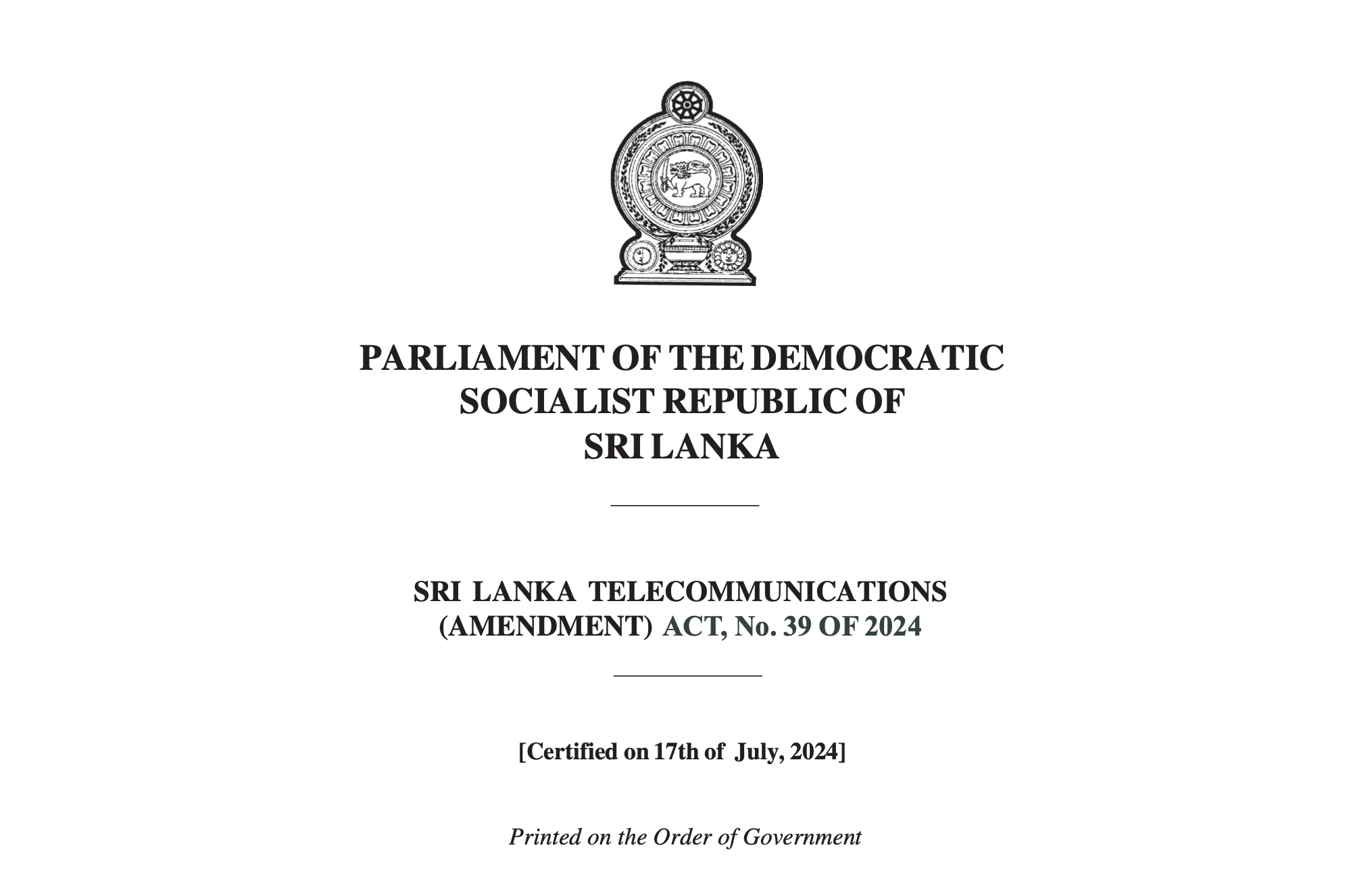1. Overview
The “Sri Lanka Telecommunications (Amendment) Act, No. 39 of 2024” introduces significant changes to the 1991 principal enactment, focusing on regulatory oversight, market competition, consumer protection, and the management of telecommunications infrastructure. These amendments aim to modernize the regulatory framework, ensuring fair competition, technological advancements, and compliance with international standards.
2. Key Amendments
- Enhanced Powers for the Telecommunications Regulatory Commission (TRC):
- Tariff Regulation: Introduction of Section 6A empowers TRC to determine tariffs based on cost orientation and non-discrimination. This ensures transparency and discourages monopolistic pricing.
- Market Analysis and Anti-Competition Measures: New provisions allow TRC to analyze market dynamics, prevent the emergence of dominant market positions, and eliminate anti-competitive practices.
- Radio Frequency Management: TRC now has the authority to allocate spectrum bands, assign frequencies, and adopt competition-based methodologies for spectrum allocation.
- Operator and Provider Licenses:
- Licenses are now mandatory for providing telecommunication services, infrastructure, and cable landing station facilities (Section 17B).
- License conditions include technical compliance, payment of prescribed fees, and adherence to standards set by TRC.
- Infrastructure Sharing:
- Operators are required to share infrastructure with competitors under TRC directives, promoting efficient resource use (Sections 17A, 35A, and 35B).
- Consumer Protection and Public Interest:
- Introduction of penalties for providing false user information, interfering with telecommunication systems, and misleading users (Sections 46A, 46B, and 46C).
- Measures to ensure universal service availability and support public interest objectives.
- Submarine Cable and Spectrum Protection:
- Establishment of the National Submarine Cable Protection Committee to safeguard underwater infrastructure.
- Enhanced penalties for tampering with submarine cables or related facilities.
- Surcharge and Penalties for Non-Compliance:
- Defaulting on license fees or cess payments incurs a surcharge of 10% for the first month, followed by 2% for each subsequent month (Section 22K).
- Magistrates can confiscate equipment used in offences and enforce penalties of up to Rs. 100 million for tampering with critical infrastructure.
3. Implications of the Amendments
- For the Telecommunications Sector:
- Regulatory Compliance: Operators and providers must adhere to stringent rules and licensing requirements, ensuring industry standardization.
- Fair Competition: New provisions foster a level playing field by curbing anti-competitive practices and encouraging infrastructure sharing.
- Technological Advancement: Emphasis on modern technologies for efficient spectrum use positions Sri Lanka to compete globally.
- For Consumers:
- Better Services: Improved regulatory oversight ensures reliable, cost-effective telecommunication services.
- Enhanced Privacy and Security: Provisions against unauthorized interference safeguard user data and communication.
- For the Government and TRC:
- Increased Authority: TRC gains expanded powers to oversee, enforce, and innovate within the telecommunications domain.
- Revenue Generation: Fines, surcharges, and license fees contribute to national revenue and reinvestment in the sector.
4. Challenges and Recommendations
- Challenges:
- Implementation Complexity: Transitioning to the amended framework may require substantial changes in operations and infrastructure.
- Enforcement of Penalties: Ensuring compliance, especially from large operators, may pose logistical challenges.
- Market Resistance: Operators may resist mandatory infrastructure sharing and regulatory interventions.
- Recommendations:
- Capacity Building for TRC: Invest in training and resources to enable TRC to effectively manage new responsibilities.
- Stakeholder Engagement: Collaborate with industry players to address concerns and ensure smooth implementation.
- Public Awareness Campaigns: Educate consumers on their rights and the benefits of these amendments.
5. Conclusion
The amendments to the Sri Lanka Telecommunications Act signify a major overhaul to modernize the regulatory framework. By addressing market fairness, consumer protection, and technological advancements, the new provisions aim to bolster the telecommunications sector’s role in economic development. However, their success hinges on robust implementation, industry cooperation, and continuous oversight by TRC.
Read the Amendment Act














